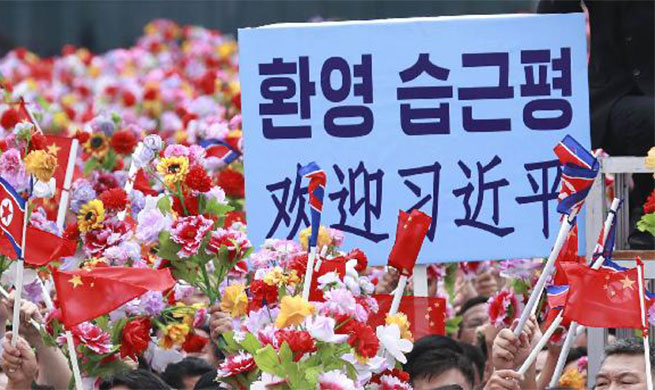TOKYO, June 20 (Xinhua) -- The Bank of Japan (BOJ) on Thursday maintained its ultra-easy monetary policy to support the economy amid ongoing concerns over the future course of the global economy.
At the conclusion of a two-day meeting, the BOJ Policy Board voted 7 to 2 to maintain short-term interest rates at minus 0.1 percent and keep its long-term interest rates at close to zero.
The central bank's board at the conclusion of the meeting also voted unanimously to leave unchanged its massive asset purchasing program.
The central bank maintained its basic assessment of the economy in a statement released after the meeting.
"Japan's economy has been on a moderate expanding trend, with a virtuous cycle from income to spending operating, although exports and production have been affected by the slowdown in overseas economies," the statement said.
"Downside risks concerning overseas economies are likely to be significant, and it is also necessary to pay close attention to their impact on firms' and households' sentiment in Japan," it also said.
Following the conclusion of the two-day meeting, BOJ Governor Haruhiko Kuroda said at news conference that the bank would remain flexible regarding its future easing options.
"We've continued to balance the benefits and costs of our tools in guiding monetary policy, and believe we can keep doing so. This is an approach we'll take if the momentum for achieving our price target is lost and we would consider additional monetary easing steps," Kuroda said.
Japan's inflation rate still remains some way off the bank's 2 percent target, with core consumer prices increasing only 0.9 percent year-on-year in April, according to the latest reading.
Kuroda said, however, that a number of options remained in the bank's arsenal if further easing measures were required.
"As for monetary easing tools, we can cut our short and long-term interest rate targets, ramp up asset purchases or accelerate the pace of increase in base money. There is no change to our view to ponder various ideas, including a combination of these steps, depending on what's most appropriate at the time," the BOJ chief said.
He also said that if the U.S. Federal Reserve cuts its interest rate to help prop up its economy, and similar moves are adopted by other central banks, it could affect the global economy.
In such a case, Kuroda said the BOJ would consider further easing.
"It's true the monetary policies of major central banks could affect the global economy. If the Japanese economy's momentum for hitting our price target comes under threat, we will consider easing policy further without hesitation," said Kuroda.
The BOJ chief also said that despite the yen's moves against the dollar and the possibility for more fluctuations should the Fed cut its rate, Kuroda maintained that the BOJ's policy was not tied to exchange-rate moves.
"When you look at how the currency pair moved yesterday and today, we're seeing a broad dollar fall instead of a yen rise. But exchange rates move on various factors, so it's inappropriate to make a judgment just from day-to-day moves," said Kuroda.
"Monetary policy does not target exchange rates. It is conducted to achieve sustainable economic growth with price stability. It's true exchange-rate moves affect the economy and prices. But we have absolutely no intention of tying monetary policy decisions with exchange-rate moves," the BOJ chief maintained.













